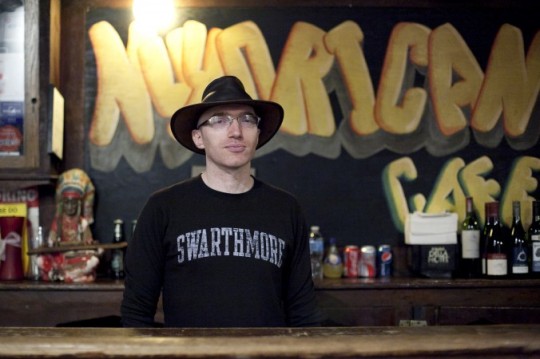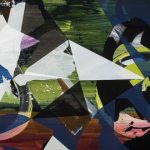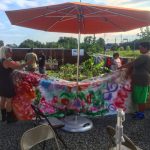IAP Interview: Daniel Gallant, Executive Director of Nuyorican Poets Cafe
“Performing on our stage is very much a baptism by fire. You quickly find out which parts of your material work and which parts don’t.”
Priscilla Son of IAP recently met with Nuyorican Poets Cafe’s Executive Director, Daniel Gallant, to discuss the organization’s 43-year history, its mission and trajectory, as well as performance opportunities available at the Cafe for our immigrant artist readers. Nestled in the lower part of Alphabet City, this multi-arts venue champions diversity, passion, and artistic experimentation.
NYFA: Can you tell our readers a little bit about the Nuyorican Poets Cafe and how it came to be established?
DANIEL GALLANT: Sure, the Cafe began in 1973 as an informal collective, based in Miguel Algarín’s East Village apartment. The group filled an important niche at a time when it was difficult for Latino artists to find much traction in the entertainment, publishing, or academic mainstream. Many of the Cafe’s original artists had singular voices and dynamic talents but were unable to make much professional headway on their own. As a collective, these writers and performers shared feedback, encouragement, and inspiration. They managed to gain visibility and ascendance through collaborative efforts.
The term “Nuyorican” refers to New Yorkers of Puerto Rican heritage. Many of the artists who helped to establish the Cafe, and many of our current artists and audiences, identify as Nuyorican. Many are also from other backgrounds. The majority of our artists and spectators are people of color in their 20s and 30s. The Cafe has always been a welcoming artistic haven for people who dwell at the intersection of multiple communities — whose cultural identities transcend traditional notions of nationality, language or ethnicity.
NYFA: Why does the Cafe strive to promote diversity in the art world?
DG: The Cafe champions artists of color from diverse backgrounds, and we facilitate the development of creative works across a multiplicity of artistic forms. As a community, we advance by exploring disparate traditions and influences. Exposure to a wide range of creative voices facilitates empathy, collective learning and societal cohesion among our audiences and artists. We aim to both entertain and challenge our spectators, so that they question traditional social practices while reaffirming their connections to community.
NYFA: If you had to describe the art showcased at the Nuyo in a few words, what would they be? Do you think performing at the Nuyo impacts an artist’s practice?
DG: The art we present is dynamic, diverse, impactful, and engaging. The creative work performed by our artists tends to be more electric, physical, and interactive than what you’d find at most cultural venues.
If you go to a symphony performance, an opera, or the ballet, your relationship with the performers and their creative work will be formal— spectators are expected to display their appreciation in polite ways and at regimented intervals. But during our poetry slams and open mics, there is constant interaction between performers and audiences. Our artists aim to elicit snaps, claps, laughs, and gasps throughout their performances. Audience members are often called upon to judge the artists’ work or to judge the judges. And many of the spectators are performers themselves. So there’s a great deal of interaction during our events, lots of creative energy exchanged between the stage and the crowd.
Many artists who perform at the Cafe early in their careers find that their experience in our venue is transformative and beneficial to their professional trajectory. Performing on our stage is very much a baptism by fire. You quickly find out which parts of your material work and which parts don’t.
Artists who perform on our stage often find ways to develop their spoken word material into longer narrative works. John Leguizamo, Sarah Jones, Caridad de la Luz, and muMs da Schemer are among the artists who have started here as spoken word specialists while developing their craft and expanding their repertoire. These artists used the creative lessons they learned at our venue to reach larger audiences with sophisticated narratives that grew out of spoken word material.
The intimacy of our performance space, the direct and spontaneous interactions between our artists and audiences, the sociopolitical immediacy of our poets’ work, and the creative experimentation they undertake, distinguish the Cafe from other cultural venues.
We try to mentor promising artists by offering guidance about how they might identify and develop their creative skills, providing them with opportunities to workshop and develop their projects, and sometimes helping them get bookings at other venues to continue their artistic growth.
NYFA: Does the Nuyo place a special emphasis on presenting poetry and theatrical works?
DG: From its earliest days, the Cafe has nurtured theatrical and poetic activity. Miguel Piñero, a co-founder of the Cafe, wrote an acclaimed play called “Short Eyes” that was produced on Broadway. Another of the Cafe’s founding artists, Ntozake Shange, wrote the now-classic work “For Colored Girls…” Piñero and Shange were at the forefront of a multitalented cohort of writers who infused stage plays with poetry and demonstrated how seamlessly the two art forms can coalesce. The legacy of these playwright-poets continues to influence our artists and our mission.
The Cafe is well-known for its performance poetry competitions, but poetry and storytelling inform all of our programs and operations. Our theater productions, Latin Jazz jams, open mic nights, education programs and hip hop events – each of these include poetic influences. Even our marketing materials and community outreach efforts reflect the Cafe’s poetic traditions. We aim to tell a consistent, lyrical story across all of our programs and communications.
NYFA: Do performances at the Cafe cover certain topics more than others?
DG: We’re known for spoken word events that have political, social and economic immediacy. Performances at our venue also tend to feature humor and musicality. Our artists address a range of themes: romance, family dynamics, employment issues, personal fears and aspirations. Much of the content at our spoken word events focuses on socioeconomic inequities, but a lot of positivity also comes through the mic. Some of our poets provide inspiration and enrichment by discussing how circumstances in their communities can improve, by using the stage to deliver constructive social criticism. The most effective performances at our venue are those that encompass both intimate and macroscopic views. The artists with the greatest impact and most longevity are usually those who juxtapose personal insights with larger societal commentary.
NYFA: Are there particular events you encourage our immigrant artists to try out at the Cafe?
DG: I think the best opportunity for someone new to this space is to try out either our Open Mic Mondays, which are accessible to performers across all art forms, or our Wednesday Night Slam Open, which is specifically geared towards poetry. On Mondays, artists can sign up to perform monologues, comedy, music, dance, storytelling, or hip-hop. Those events are exciting but non-competitive; there’s a very supportive environment on Monday nights, and no one is keeping score between the performances. The Slam Open on Wednesdays is competitive; if someone wins a Slam Open, they get to compete in one of our Friday Night Poetry Slams, which are our signature events. Both the Open Mic Mondays and the Slam Opens feature a mix of rising and established artists, most of whom are trying out new material. We also host twice-monthly hip-hop open mics, which feature a live band.
Artists also have the opportunity to propose a full show to us. Sometimes an individual artist will propose a play or a series of musical performances; on other occasions, a collective of artists may want to perform a series of thematically connected works on the same night. While open mics are very exciting and unpredictable, and they offer individual performers a spontaneous opportunity to perform short works before an enthusiastic crowd, artists who book a full show with us months in advance are able to present work that is more polished and structured. An open mic can be an effective vehicle for individual artists who specialize in shorter performances, while a structured evening can feature more curated programming and can allow for more collaboration among artists. Structured events also give each artist’s work more room to breathe, and help us become more familiar with each artist’s voice and vision.
The barriers to entry are low for our open mics; all you have to do is arrive early on the night of the show. Usually, the first 20-25 people in line have the opportunity to perform for a few minutes each.
For more structured shows, artists or collectives send us proposals in advance. If we accept the proposal, our standard arrangement is a 50-50 split of admission, with a security deposit. Artists and companies can also rent our space, but we generally encourage an admission split for artists who propose events that are in line with our mission and aesthetics. We prefer to collaborate with artists whose voices are evocative and whose creative goals are ambitious, but whose production needs are realistic.
NYFA: Are there opportunities for visual artists?
DG: We often have paintings, photographs, or drawings on the walls, and we are always open to receiving submissions. There isn’t a set exhibition schedule, so visual art shows happen on a case-by-case basis. If the work is interesting and a good fit for our space, we’ll certainly consider it.
Daniel Gallant is the Executive Director of the Nuyorican Poets Cafe, as well as a writer, producer, actor, and teacher. Daniel is the recipient of a 2016 Eisenhower Fellowship and an alumnus of National Arts Strategies’ Chief Executive Program. He previously served as the Director of Theater and Talk Programming at the 92nd Street Y’s Makor and Tribeca centers, and has produced dozens of theater, music and charity events at venues including Summerstage, Town Hall, Brooklyn Museum, Joe’s Pub, Abrons Arts Center, and the DR2 Theater. Daniel has been featured in the Wall Street Journal, the New York Times, Crain’s New York, the Daily News, Time Out New York and Voice of America; and on MTV, NBC, NY1, CBS, NPR, Univision, the BBC and other networks. His writing has appeared in the New York Post, Howlround, Shotgun Honey, BK Nation and anthologies from TCG, Vintage Books and Applause. According to the Wall Street Journal, “Mr. Gallant has exploited expanding social-media tools to grow the cafe from a small, volunteer-led venue best known for weekly poetry events to a thriving arts center with partnerships across the city.”
Nuyorican Poets Cafe is located at 236 E 3rd Street, New York, NY 10009. If you’d like to learn more about the Cafe, visit their website at www.nuyorican.org. To propose a show, send a brief overview of the event to [email protected]. You can follow Daniel Gallant on Facebook, Twitter, or LinkedIn.
This interview originally appeared in the ConEdison Immigrant Artist Program Newsletter #85. Subscribe to this free monthly e-mail for artist’s features, opportunities and events here.
– Interview conducted by Priscilla Son, Immigrant Artist Program Intern
Image: Samira Bouaou, Epoch Times, Daniel Gallant Nuyorican






